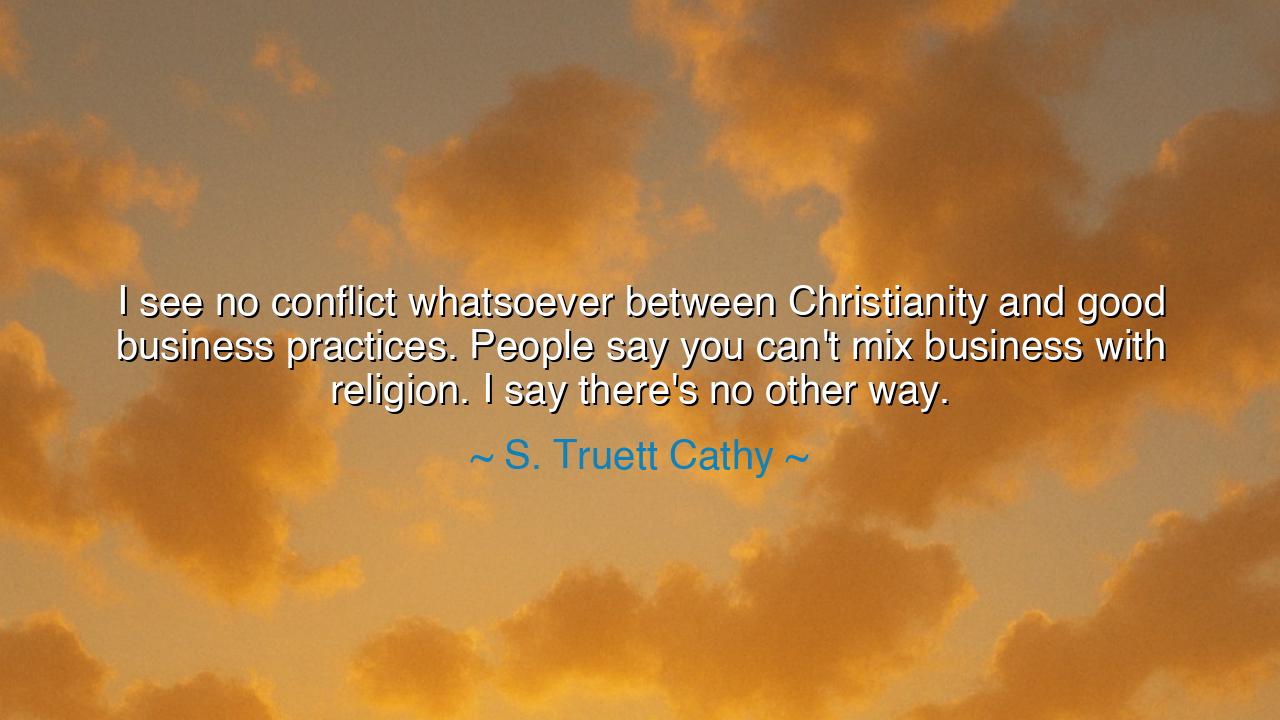
I see no conflict whatsoever between Christianity and good
I see no conflict whatsoever between Christianity and good business practices. People say you can't mix business with religion. I say there's no other way.






Hear the words of S. Truett Cathy, spoken not as idle thought, but as the creed of his life: “I see no conflict whatsoever between Christianity and good business practices. People say you can’t mix business with religion. I say there’s no other way.” These words shine with both conviction and challenge. For in an age when many separate the sacred from the practical, when faith is hidden in private chambers while commerce rules in the public square, Cathy dared to proclaim that the two are not enemies, but allies.
The origin of this saying comes from Cathy’s own life as the founder of Chick-fil-A, a business built not merely on profit, but on principles. He believed that Christianity—with its emphasis on honesty, service, humility, and love for one’s neighbor—was not only compatible with commerce but essential to it. Where others saw business as a battlefield of ruthless competition, he saw it as a platform for stewardship, a means to serve both customers and employees with dignity. Thus, his words were not theory but testimony: his company thrived precisely because it was anchored in faith.
History offers us echoes of this truth. Consider the Quakers of England and America, merchants known for their simplicity and integrity. Because they refused to cheat or deceive, because they honored contracts and treated others fairly, their businesses grew and flourished. Their reputation became their greatest wealth. In them, as in Cathy’s words, we see that good business practices need not be separated from religious principles—indeed, they are strengthened by them.
And yet, how often does the world scoff at this union? How often have men said, “You cannot mix business with religion. Faith belongs in the church; profit belongs in the marketplace”? Cathy’s bold reply was, “There’s no other way.” For to him, separating the two was to live divided, to act with one face in worship and another in trade. Such hypocrisy destroys both faith and business. He believed instead in wholeness of character, where the same values guide a man in prayer and in partnership, in Sunday service and in Monday’s labor.
There is power in this vision. Imagine a world where all merchants dealt fairly, where all employers cared for their workers, where all leaders saw profit not as the sole aim but as the fruit of serving well. Such a world would reflect the harmony Cathy spoke of—a union of Christianity and business, of morality and industry, of love and labor. The cynic may laugh, but history has shown again and again that enterprises built on trust and service endure longer than those built on greed.
The lesson, O listener of tomorrow, is this: do not divide your life into sacred and secular, faith and function. Let your values guide you in every realm. If you claim honesty, be honest in contracts. If you claim compassion, show it to employees and strangers alike. If you honor God, let your business dealings reflect His light. For integrity is not something one wears like a cloak only on holy days—it must be the skin itself, covering every act and decision.
Therefore, take action. In your labor, seek not only profit but purpose. Build enterprises, however small, upon the rock of faith, fairness, and service. Treat each transaction as a chance to honor both God and neighbor. In this way, your work will not merely sustain your body—it will nourish your soul. And when your days are done, it will be said of you: this man, this woman, did not divide their life, but lived as one whole being, uniting business with belief, and proving, as Cathy said, that there is indeed “no other way.”






AAdministratorAdministrator
Welcome, honored guests. Please leave a comment, we will respond soon